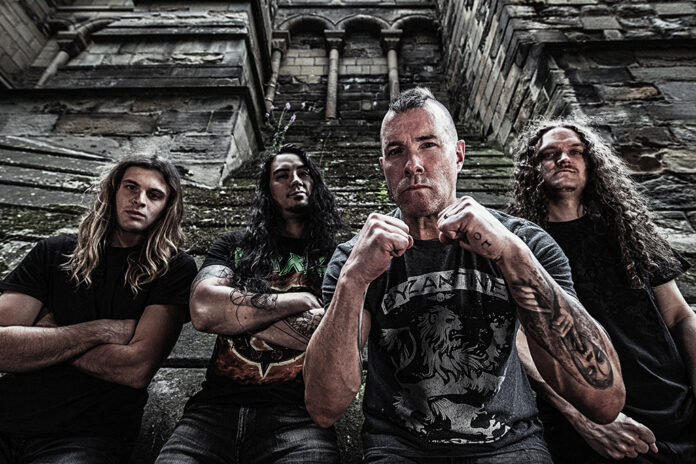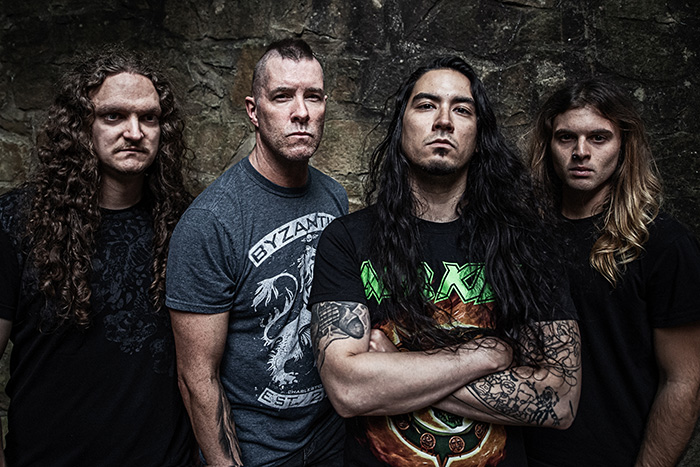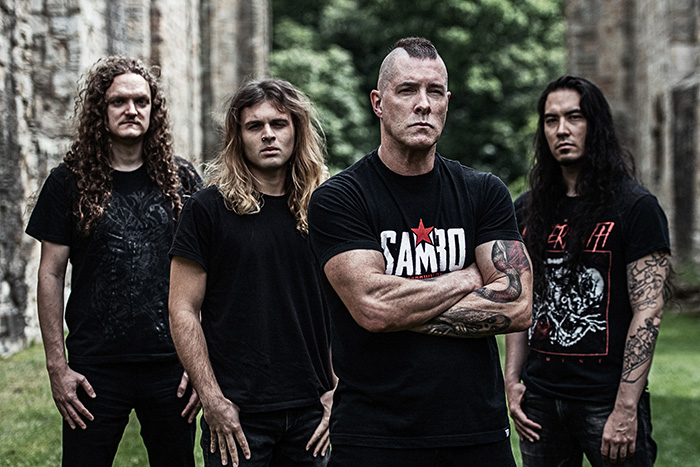
INTERVIEW WITH JEFF WATERS BY ANDREW CRAIG
PHOTOGRAPHS BY KAI SWILLUS
The latest album from veteran Canadian metal act Annihilator is Metal II, a quasi-re-recording of the of the 2007 album Metal. Although all the guest musicians remain from the original release, this new version replaces Dave Padden (vocals/guitarist in Annihilator 2003-2014) and journeyman drummer Mike Mangini, with new full-time Annihilator vocalist Stu Block (Into Eternity/ex-Iced Earth) and former Slayer drummer Dave Lombardo. Admittedly, it seems like a bit of a random release for the band coming out the pandemic, but in reality Metal II is the culmination of a series of events that had a huge impact on the legacy of the band and brought band leader Jeff Waters to the brink of death.
The original Metal album stands out for its collaborations, but also the way that Waters took chances and played outside the metal box, a characteristic that dominates the latter half of the band’s career. It seems that when Annihilator comes up in conversation, it’s usually worship for the first two releases, 1989’s Alice in Hell and 1990’s Never, Neverland.
“If you go to Germany, Spain, Holland, anywhere over here except maybe a few Scandinavian countries, Alice in Hell is not ranked as the number one Annihilator album,” says Waters from his UK studio.

“Geographically, absolutely, we dropped out of the North American market, but since then we’ve sold four million records. Almost all of them were only released in Europe, Japan, and South America. 1993 was our last real release in North America. Our first two albums were pretty big there, but I disappeared. I had never even tried to get back in to the United States and Canada for decades. If you’re the guy who writes almost all of the songs, plays on the album, produces, mixes, engineers, masters, works on the cover, books most of the festivals and most of the tours, manages, takes care of all the business, you could go on and on…if you do all that stuff you don’t have a lot of time. The one good thing that happened to us from getting dropped by Roadrunner Records in 1993 was I actually found that our following overseas kept ramping up and kept going. I got out of this four week depression I had when they let us go, and my manager said, ‘This is the best thing that could have happened to you, your band, and your career. You’re now actually out of a long-term, typical, old school, the artist is screwed contract. Now you’re free.’ Since then the fanbase, labels, publishers, and press are only interested in us in Europe. I thought that I’d forget my home country and we’ll go over there, and it just stayed like that, up until even today.”
“I THOUGHT THAT I’D FORGET MY HOME COUNTRY AND WE’LL GO OVER THERE, AND IT JUST STAYED LIKE THAT, UP UNTIL EVEN TODAY.”
Then there’s the modern diversity of the Annihilator catalogue. To be an Annihilator fan is to either accept the fact that not every album will be for you, or to accept Waters’ vision of a band that can and will explore a variety of sounds with a variety of musicians. It’s a formula that could be defined as a lack of formula, but it’s an idea that put Annihilator at the top of the charts in Japan and cemented their status in Europe.
“I write kinda goofy songs one minute about Kraft Dinner and chicken and corn, next minute I’m writing a heavy thrash song, next minute I’m doing some ballady thing, next minute it’s some disgusting murderous lyrics that should be in a Cannibal Corpse song, but it’s acoustic,” he says chuckling.
“That’s actually the wrong way to go if you’re trying to develop a big fan base or sell records. Image, sticking to a formula like an AC/DC or a Slayer did, that worked for them, and those are my two favorite bands. That kind of music was not accepted in the States or Canada during a time when the vocals got heavy and screamo-ish in the 2000s and onward. But I got really lucky. For half my career Japan was nuts about us, like a Bon Jovi level, it was ridiculous. It was ‘Bed of Roses’ and an Annihilator song called ‘Only Be Lonely,’ a ballad, fighting for the top spot. Then I had a fan base in Europe, it was so varied. They were so open to my ridiculous extremes, heavy metal with cheesy lyrics sometimes—all this wacky stuff thrown together and lack of a focused style. For North American fans who don’t know anything about us, don’t worry. You shouldn’t necessarilyknow anything about us. We’ve got a whole bunch of singers and different styles of metal music. Some of it freakin’ good, some of it not so good, some of it average. We’re also trying to get back to North America and do some shows, no matter what they’re like, and have a lot of fun with it.”
“IF I WAS LUCKY TO HAVE A REAL FAN BASE IN NORTH AMERICA, I THINK MY PERSONAL LIFE, MY ADDICTION LIFE, HEALTH AND EVERYTHING WOULD HAVE GONE TO SHIT!”
The rise of the internet did help a cult of fans flourish back in North America. Although the band does play Canadian shows now and then, Waters makes it clear that doing so more often over the years would not be a pleasant experience, and perhaps would have had a negative effect on his entire life.
“When the internet started a few people started going, ‘I remember that band,’ or, ‘Who are these guys? Why are they not playing in our country?’” he says.
“If I had toured North American more, I would have been one of these poor musicians who is thrown into a nasty tour bus by a label on a four band package with no showers. I woulda done that for two years and toured the States three times. I watched my friends’ bands go through these bills. Bands that were on Billboard charts. You’d see Machine Head, Trivium, Children of Bodom. I remember Alexi [Laiho of Children of Bodom] saying, ‘Yeah, it’s the third or fourth time we’ve toured America for the same album,’ while the record company’s makin’ all the money, and they’re starving! It was unbelievable. If I was lucky to have a real fan base in North America, I think my personal life, my addiction life, health and everything would have gone to shit! I’m really lucky the way it worked out, I can tell you that!”

Annihilator’s most recent full studio album is 2020’s Ballistic, Sadistic, released just before the pandemic hit. The album was already out, and the band had a successful pre-release tour. This put Waters in a good place when everything shut down. He was able to help out a few well known musician friends that were suffering financially and also made a donation against animal cruelty to the RSPCA in the UK. But while he escaped the more severe financial effects of the pandemic, Waters and his family were unlucky enough to be affected by COVID itself. It was also an experience that would affect Annihilator’s very legacy.
“I may have escaped what most musicians end up having to deal with, but I got that near death thing goin’ on at the time,” he says seriously.
“I got hit with COVID severely, and my family got hit. I’m sure a lot of people say this, but I had it really bad. Not as bad as Will [Carroll] from Death Angel, but we’re talking two weeks where I wasn’t sure what was going to happen. It felt like someone sitting on my chest. Each breath in and out was like a fire crackling, like a severe asthma attack. It was brutal. I went to the hospital, they turned me away. They said, ‘If we admit you, we’re going to put that breathing tube down your throat and you don’t want it. Another one to two percent less oxygen and then you’d have to be admitted.’ I took that gamble and I went home, and I made it through. But it took me about six months to recover my lungs. I don’t know what it was, they say ‘long COVID,’ but it devastated my lungs. I couldn’t sit in this chair. I was having problems going up and down stairs, it was just nuts.”
“IT FELT LIKE SOMEONE SITTING ON MY CHEST. EACH BREATH IN AND OUT WAS LIKE A FIRE CRACKLING, LIKE A SEVERE ASTHMA ATTACK. IT WAS BRUTAL.”
It was an experience that made Waters take a deeper look at his life and career. He had just turned 55, had a loving family, hadn’t had a drink for over 20 years, and hadn’t smoked in three years. But while his own house was order, he realized the Annihilator legacy was in disarray, and as soon as he regained his health, he began the huge process of the consolidating the band’s entire catalog, with the intention of selling the whole thing.
“I took stock of my life in that time and did what some people end up having to do, which is sitting back and actually, really talking to yourself going, ‘Oh fuck! What if this is the big one?’” he exclaims.
“I thought, ‘Okay, number one, my family, do they know I love ‘em? Yes, they do. Number two, are they financially okay? Yes, they are. Number three, how’s my little music legacy? Then I realized that if I dropped dead tomorrow I didn’t have that in order. I had all these releases scattered around, they weren’t on iTunes or Spotify, no one could get ‘em. When I recovered I got everything together, 22 releases, got them all back. Got them all here in my studio. Spent three months working on it all, remixing the audio and remastering, and then shopped around for record companies. This was before everybody started selling their stuff. I saw the Jimi Hendrix debacle, way back when the family was fighting about the legacy and the rights, going back-and-forth in court. I thought in my case, in my little world, I’m gonna get everything back and I’m gonna sell it, because nobody knows a record deal and publishing more than a record company and a publishing company. So, let’s get it all to them and write the past off. If anybody ever hears of my band and wants to get stuff, they’ll get the best versions we can give them, and they’ll always be there. So, at least that job’s done now, by me.”
“HOW’S MY LITTLE MUSIC LEGACY? THEN I REALIZED THAT IF I DROPPED DEAD TOMORROW I DIDN’T HAVE THAT IN ORDER.”
With the remixed and remastered Annihilator catalog set for release over the next few years by German label earMusic, Waters was approached to create something new to help promote the deal. This was the final catalyst that led to the creation and release of Metal II. For Waters, the first Metal release was the one album that he felt could have been done better under different circumstances. Waters himself felt rushed with competing schedules and dealing with the rights involved with getting all the featured guest musicians. That along with some other external factors led him to feel that he along with Padden and Mangini just didn’t make it work overall. He proposed to the label that he partially rerecord the album with a new lineup, as well keep plans to reissue the original Metal album so as to not insult Padden, Mangini, or fans who enjoyed it the first time.
“Why don’t we redo it with my favorite living drummer and one of my favorite singers?” says Waters happily.
“Also put that out! Let’s do it for fun! Don’t do it with the idea that this is a studio album, where we’re gonna take lots of time on the tracks. In fact, do the opposite. Get the singer and the drummer to do it on their own, the way they want to do it. Not the way Waters or some producer says they have to do it. The two guys were stunned because they were not used to that in any situation. I actually wanted to get Stu Block in Annihilator way back when he first started, but I couldn’t get him in time. He said yes right away because he liked the early Annihilator records! See!? (laughs) Redoing it was not to do it ‘the way it should have been.’ If I’d done that I would have flown Lombardo in, and we would have done a real studio album and taken a week on the drums. We’re not trying to top the other one.”
Waters credits Block as an extremely versatile vocalist, able to flow between classic and more extreme metal styles. He says he encouraged Block to follow his own instincts in terms of his vocals on Metal II, which sent the singer into a bit of a panic. It wasn’t until the song “Couple Suicide” featuring Danko Jones and Angela Gossow that Block found his “groove” as Waters puts it.
“That’s the only song on the record that I was scratching my head at going, ‘The originals are always better no matter what you do,’” he says.
“Some people could probably make better production when they do it, or something’s better like their drummer’s Dave Lombardo! Danko and I had written songs together for a couple Annihilator records. But that song, that’s the one out of the whole thing where I can honestly say, that’s smokin’. The rest are just us having fun doing our thing. ‘Couple Suicide’ with Stu and Dave doing it, it’s fantastic.”
Metal II signifies a new chapter for Annihilator. Waters says that he’s working on a project that he calls “hard rock” and “not heavy metal.” But he also says that the days of new Annihilator albums may be over. With the catalog secure and having taken stock of his career and legacy, Waters is hyper aware of the type of album he wants to release, and in his mind it’s not something that’s possible. What is possible is to get the music in front of as many people as he can.
“The record we did put out, just before the pandemic, was probably the best one I’m ever going to be able to do again, because when you’re the main writer and you’ve been doing this a long time, you do copy yourself and you do draw too much sometimes from other bands,” he says.
“It is easier to repeat yourself often. I have this surge where I get one or two records that are kind of like, ‘Meh,’ and then you get the one where you’re like, ‘Okay that one brought us back!’ Ballistic, Sadistic, that’s probably the best I’m gonna get. We all know the phrase quit when you’re ahead. We’ve all got our favorite bands, but we don’t like every single song and record that they’ve ever done. I’ve got every Iron Maiden and Priest, all the old stuff and new stuff. I don’t like every record. Never, Neverland is our Back in Black, and I’m never gonna get that again—a record where almost every song on it is badass. I wanted to try early on, but if AC/DC didn’t or couldn’t do Back in Black again, and Slayer couldn’t get Reign in Blood again, I knew that wasn’t going to be the case for us. But the continued part is going to be playing shows, playing with some bigger bands in Europe, and making it to the States and Canada again. That’s my real focus on the band.”




















